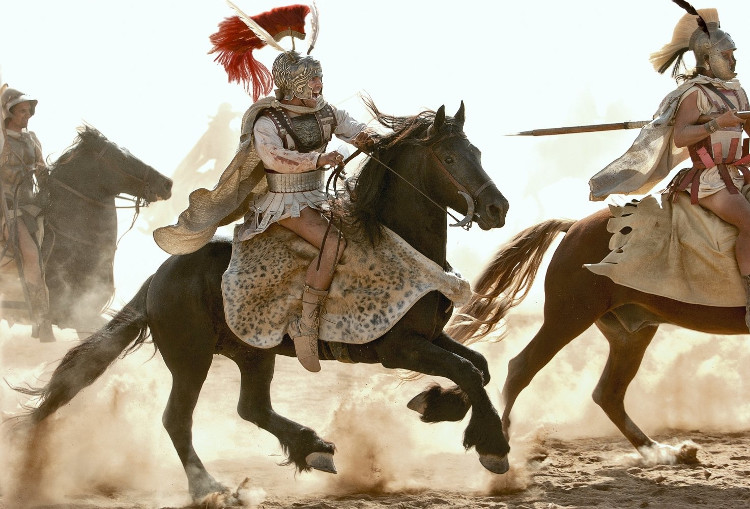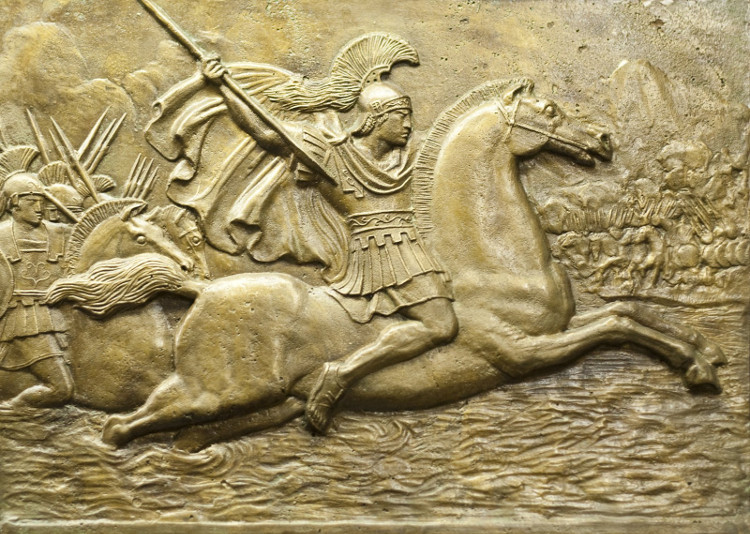The king is proud to conquer more than 5 million km2 on 3 continents
Alexander the Great was the king of the Kingdom of Macedonia, Ancient Greece, from 336 BC to 323 BC (BC). During his leadership, he reunited Greece, conquering the Persian Empire. With the glorious feat, Alexander the Great is considered one of the most powerful military leaders and most powerful rulers in history, according to the History page.

Painting illustrates Alexander the Great - one of the most talented kings in ancient history.
Dream of a warrior
Alexander the Great was born in the ancient Kingdom of Macedonia of Greece on July 20, 356 (BC), the son of King Philip II and Queen Olympia.
Growing up, Alexander hardly ever met his father, who spent most of his time in military campaigns. He began to study mathematics, horse riding and archery.
In 343 BC, King Philip II hired Aristotle to teach Alexander. For three years, Aristotle taught Alexander philosophy, poetry, drama, science and politics. At that moment, the philosopher realized that Alexander dreamed of becoming a heroic warrior.
Alexander completed his studies in 340 BC. A year later, while still a teenager, he became a soldier and embarked on the first conquest against the Thracian tribe. In 338, Alexander was in charge of an army and helped his father defeat the enemy.

From a young age, Alexander dreamed of becoming a heroic warrior.
When Philip II succeeded in the unification campaign of the ancient Greek city states (except Sparta), the father and son union soon fell apart.
Philip II married Cleopatra Eurydice, the granddaughter of General Attalus, leaving Alexander's mother no longer a queen.
The parents of Alexander were forced to leave Macedonia, to live with their mother's family until Alexander and King Philip II reconciled their differences.
King of Macedonia
An important milestone in Alexander the Great's life was the death of his father. In 336 BC, King Philip II was assassinated.
Alexander, then 19, decided to win the throne in any way. He quickly received the support of the Macedonian army, the generals and soldiers who fought with him.
The army claimed that Alexander was king, but he did not immediately take control of the entire land that was very unstable after the king's death.
With innate talent, the 19-year-old young man of that year rebelled, reuniting the ancient Greek city before going on to conquer the giant Persian Empire.

With innate talent, the 19-year-old young man of that year rebelled, reuniting the ancient Greek city before going on to conquer the giant Persian Empire.(Illustrations).
With an army of 32,000 infantry and 5,100 cavalry, the king of Macedonia - Alexander the Great defeated the territories of the Persian Empire in Asia Minor, Syria, Egypt without losing any battle.
He marched to Peninsula Asia Minor in 334 BC and captured the city of Baalbek, according to Ancient.eu.
In 333 BC, the invincible emperor continued to conquer new lands, including Syria and Egypt, where he founded a new city called Alexandria - which was designed as a cultural and commercial center. Greek.
However, according to historians, his greatest victory was the battle of Gaugamela - the final confrontation with the Persian Empire's mighty army.
The legendary Gaugamela battle
Alexander met the Persian army in the Gaugamela plains, near present-day Irbil, Iraq.
His Macedonian army discovered light from concentration camps, which contained about 100,000 Persian soldiers.
The general advised Alexander to overthrow the Persian army but he did not listen. The king did not want to take advantage of the situation and wanted to defeat the Persian king Darius III in a straight battle. Just like that, the new Persian king never dared to attack the Macedonian army again, according to the History page.
Two armies met on the battlefield the next morning, October 1, 331 BC. The number of Persian troops overwhelmed the Macedonian (about 100,000 and 47,000).

Alexander's greatest victory was the battle of Gaugamela - the final confrontation with the Persian Empire's mighty army.(Illustration).
First, the king ordered the archers, stoned soldiers and cavalry to attack the left wing of the Persian army. The Persian army also rushed into the middle part of the Macedonian army but were prevented.
Darius's left wing cavalry was then caught up in the war initiated by Alexander, leaving the infantry force "open" in the middle.
Taking advantage of this 'hole' , Alexander and the cavalry rushed to attack the Persians as well as the rival king. Darius fled and panic spread throughout the army, leading to the defeat of the Persian army.
After the war, the Macedonian side only lost about 700 people while the Persians lost 20,000 people. Alexander occupied Babylon, the capital of Persepolis of Persia, and has since claimed to be the king of Asia.
Four months later, Macedonian troops burned the royal palace in Persepolis, ending the ancient Persian empire.
Military military house
The talent of the great king has been recorded by many historians. He was not only a brilliant man but also wise and respectful of soldiers.
When he was at war, Alexander was always a leader and could easily be discovered. This made him the target of the enemy but also inspired his army.

The statue of Alexander the Great is placed in many museums around the world.
According to Changing minds, the king was really brave and was wounded many times but never left the soldiers on the battlefield. He once said: "It is a wonderful thing to live with courage and to die to leave a reputation".
The king respected his soldiers and never betrayed their trust. The great king fought alongside the soldiers, ate with them and refused to drink water when there was not enough for everyone.
When the battle was fought, Alexander often displayed an arrow in the form of an arrow - something he believed would make the team more stable and the opponent could hardly penetrate.
The greatest strength of the Alexandrian army is probably flexibility, according to Documentarytube. As a great tactician, Alexander regularly adjusted tactics in battle. Because the soldiers still needed to move quickly from one location to another, he let them wear light armor.
In addition, Alexander is also eager to learn, according to Acient.eu. While conquering, he always tried to understand the new land. The king took the scientists to record and analyze many information such as biology, biology, zoology, meteorology, terrain and take advantage of this information to win the battle.

Alexander always battles with his soldiers.
In terms of military strategy, Alexander was considered a wise king. When he ruled the kingdom, he was quite careful in minimizing all risks of instability. He treated the political prisoners well and saw the advantage of solidarity or separation. As a good politician, Alexander is fluent in many languages, therefore, capable of persuading and manipulating skillfully. He is also particularly careful when dealing with religious characters, according to Changing minds.
However, the great king was often very cruel to the opponents. When the city of Thebes heard rumors that he had been killed in the northern war, they rebelled. Alexander then marched forces to the city for 13 days, killed thousands of people and gave the rest to slaves.
In sum, within 8 years, as king, commander, politician, scholar and explorer, Alexander brought his army away nearly 18,000 km, established more than 70 cities and created The empire spreads over three continents, covering more than 5 million km2.
Alexander the Great died of malaria in Babylon (now Iraq), on June 13, 323 BC. He was 32 years old at the time.
- How do the continents of the Earth form?
- Forests only have 31% of global continental areas
- Asia will crash into America
- Revealed inside the tomb of King Richard III
- Scientists discovered that two large continents have disappeared
- Apple reached the milestone of 100 million iPods shipped
- It has not been decided where to bury King Richard III
- Karlmann King - the world's most expensive SUV
- The boy touched the two continents at the same time
- Delete oan for King Richard III
- Who is BB King and what is Google celebrating today?
- King Richard III will be buried
 The Indian prophet prodigy warned 3 events and what will happen on April 13, 2022
The Indian prophet prodigy warned 3 events and what will happen on April 13, 2022 Top 8 youngest professors in the world: Teaching university at the age of 18
Top 8 youngest professors in the world: Teaching university at the age of 18 Elena Cornaro Piscopia - The world's first female doctor of philosophy
Elena Cornaro Piscopia - The world's first female doctor of philosophy The ancient Greek philosopher was executed for understanding the Moon
The ancient Greek philosopher was executed for understanding the Moon